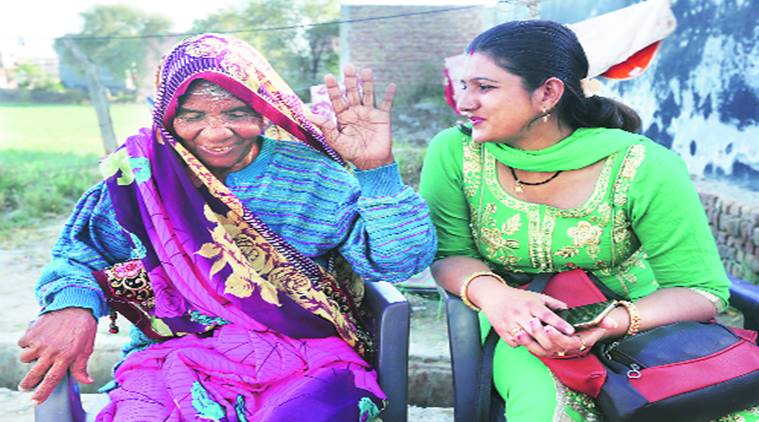Stay updated with the latest - Click here to follow us on Instagram
The unlikely journey of two women — from halfway home to home
Any talk about their years of disappearance makes them uncomfortable, but, for Rajalaxmi and Hubbi, both in their 70s, it could have been worse.
 Hubbi (left) at her home in Baprola with a Nav Kiran staffer. (Express photo by Prem Nath Pandey)
Hubbi (left) at her home in Baprola with a Nav Kiran staffer. (Express photo by Prem Nath Pandey)
In 2015, one stepped out of her home in Andhra Pradesh’s Vijaywada, while the other walked across the field abutting her two-room tenement in Delhi’s Najafgarh. Neither was seen again for almost three years.
Today, they sit smiling among family members, cook for them, throw occasional tantrums and, occasionally, regale them with stories. Any talk about their years of disappearance makes them uncomfortable, but, for Rajalaxmi and Hubbi, both in their 70s, it could have been worse.
At north Delhi’s Nav Kiran halfway home for the mentally ill, not everyone is as fortunate. Rajalaxmi and Hubbi are the only two inmates — out of the 41-odd who were moved to the facility from old age homes and other destitute homes across the city in August last year — who have been successfully rehabilitated with their families, said Sangeeta Khatri, superintendent of Nav Kiran I and II in Rohini’s Sector 3.
While Hubbi was reunited with her family on October 11 last year, Rajalaxmi reached Vijaywada on November 27. “Such rehabilitation is extremely rare,” Khatri said. Halfway homes cater to mentally ill patients who are not fit to stay at home but do not need hospitalisation either as medication and therapies can cure them.
At one point, it was not just their families but even the staff at Nav Kiran who had nearly given up hope. Khatri said that both women were mentally ill, and Rajalaxmi spoke a language they didn’t understand. Both had retreated into a shell at the old age home, where not everyone has a psychological disorder.
“After they moved here, they started undergoing medication and therapies. Within a few months, Rajalaxmi started
communicating. But language turned out to be a Himalayan barrier. We simply could not understand her sentences,” said Savita, a welfare officer at the home, the first such facility to have been launched in the capital in August, 2017. One more halfway home has started in Rohini’s Sector 22, while two more are coming up in Dwarka and Narela. Nav Kiran I and II can accommodate 80 women inmates; the current strength is 39.
The fact that she spoke Telugu could be established only when Rajalaxmi’s scribbles were read by a doctor, who also hails from Andhra Pradesh, at Baba Saheb Ambedkar Hospital, as well as an officer in the social welfare department. But her family still could not be traced as the location she claimed to hail from turned out to be wrong.
“Initially, we made calls to police stations in Andhra Pradesh but in most cases, the officers didn’t speak Hindi or English. Then we contacted Andhra Bhawan in Delhi. The day she was taken there, we found her family through mediapersons from the region who were sitting there. She struck up a bond with everyone within minutes due to familiarity of language,” Ritu, another welfare officer at the home, said.
The Indian Express spoke to her via video chat on Tuesday. Her nephew Sarath translated what she said, as his aunt sat between her grandchildren, intently looking at the Nav Kiran staff waving at her.
Around 2,000 km away, in Baprola village near Najafgarh, Hubbi’s son Ganga Ram called out to her. “Amma, bahar aao. Dekho kaun aaya hai tumse milne,” he said, referring to a staffer from the halfway home. Hubbi slowly walked out and sat in one of the chairs, as children hopped around excitedly.
Ganga Ram said that before disappearing, Hubbi was seen walking across the field next to their house. “For three years, we looked for her everywhere. One day, the driver of the ambulance who took her to Nav Kiran from Bindapur happened to speak to one of my grandchildren. He sought a picture of her and immediately identified her. Subsequently, we found her,” he said.
Jagriti Singh, a psychiatric social worker at the home, said, “In most cases, we have absolutely no idea about their past. When such people are found roaming around, they are picked up by police and are sent to old age homes. But many of them need special medical care, counselling by psychiatrists and other experts as they suffer from dementia, schizophrenia, etc. In psychiatry, we diagnose a patient based on a history, but we do not have a reliable history in many such cases.”
Back in Baprola, Hubbi snapped at her neighbours who advise her against going out without informing family members in the future: “Main kyun jaunga apne bacchon ko chor ke?”







